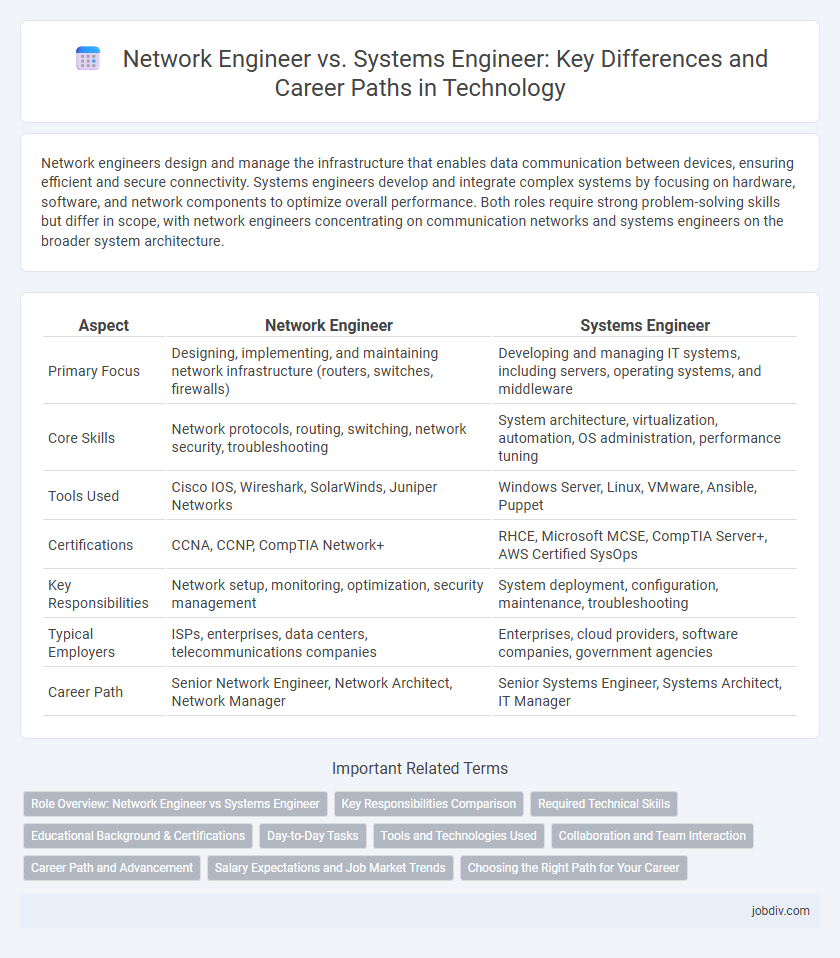Network engineers design and manage the infrastructure that enables data communication between devices, ensuring efficient and secure connectivity. Systems engineers develop and integrate complex systems by focusing on hardware, software, and network components to optimize overall performance. Both roles require strong problem-solving skills but differ in scope, with network engineers concentrating on communication networks and systems engineers on the broader system architecture.
Table of Comparison
| Aspect | Network Engineer | Systems Engineer |
|---|---|---|
| Primary Focus | Designing, implementing, and maintaining network infrastructure (routers, switches, firewalls) | Developing and managing IT systems, including servers, operating systems, and middleware |
| Core Skills | Network protocols, routing, switching, network security, troubleshooting | System architecture, virtualization, automation, OS administration, performance tuning |
| Tools Used | Cisco IOS, Wireshark, SolarWinds, Juniper Networks | Windows Server, Linux, VMware, Ansible, Puppet |
| Certifications | CCNA, CCNP, CompTIA Network+ | RHCE, Microsoft MCSE, CompTIA Server+, AWS Certified SysOps |
| Key Responsibilities | Network setup, monitoring, optimization, security management | System deployment, configuration, maintenance, troubleshooting |
| Typical Employers | ISPs, enterprises, data centers, telecommunications companies | Enterprises, cloud providers, software companies, government agencies |
| Career Path | Senior Network Engineer, Network Architect, Network Manager | Senior Systems Engineer, Systems Architect, IT Manager |
Role Overview: Network Engineer vs Systems Engineer
Network Engineers specialize in designing, implementing, and managing computer networks, ensuring reliable connectivity and optimal performance across LANs, WANs, and cloud infrastructures. Systems Engineers focus on integrating, configuring, and maintaining operating systems and software platforms to support business applications and IT services. Both roles are critical in IT infrastructure but differ in scope, with Network Engineers centered on communication frameworks and Systems Engineers on computing environment stability.
Key Responsibilities Comparison
Network Engineers design, implement, and manage network infrastructure including routers, switches, and firewalls to ensure secure and efficient data communication. Systems Engineers focus on configuring and maintaining servers, operating systems, and software applications to support IT environments and optimize system performance. Both roles require expertise in troubleshooting, but Network Engineers specialize in network protocols and connectivity, while Systems Engineers concentrate on operating system management and system integration.
Required Technical Skills
Network engineers require expertise in routing protocols (BGP, OSPF), network security, and hardware configuration involving switches, routers, and firewalls, alongside proficiency in network monitoring tools like Wireshark and SolarWinds. Systems engineers must master operating systems (Linux, Windows), virtualization platforms (VMware, Hyper-V), scripting languages (Python, PowerShell), and configuration management tools such as Ansible or Puppet to automate system deployments. Both roles demand strong problem-solving skills, but network engineers focus on connectivity and data flow optimization while systems engineers emphasize infrastructure scalability and system integration.
Educational Background & Certifications
Network Engineers typically possess a bachelor's degree in computer science, information technology, or network engineering alongside certifications such as Cisco Certified Network Associate (CCNA) and CompTIA Network+. Systems Engineers often hold degrees in computer science, software engineering, or systems engineering complemented by certifications like Microsoft Certified: Azure Solutions Architect Expert and Red Hat Certified Engineer (RHCE). Both roles benefit from continuous education, but their certification paths emphasize distinct skills tailored to network infrastructure management or comprehensive systems integration.
Day-to-Day Tasks
Network engineers configure, maintain, and troubleshoot LANs, WANs, and other data communication systems to ensure seamless connectivity and optimize network performance. Systems engineers manage and support IT infrastructure, including servers, storage, and virtualization platforms, ensuring systems are stable, scalable, and secure. Both roles require monitoring system health, implementing updates, and collaborating to resolve cross-functional technical issues efficiently.
Tools and Technologies Used
Network Engineers primarily utilize tools like Wireshark for protocol analysis, Cisco IOS for configuring routers and switches, and network monitoring platforms such as SolarWinds. Systems Engineers focus on operating systems like Linux and Windows Server, virtualization technologies including VMware and Hyper-V, and configuration management tools like Ansible and Puppet. Both roles leverage scripting languages such as Python and PowerShell to automate tasks and enhance infrastructure efficiency.
Collaboration and Team Interaction
Network Engineers and Systems Engineers collaborate closely to ensure seamless IT infrastructure performance, with Network Engineers focusing on optimizing connectivity and Systems Engineers managing server and application environments. Effective communication between these roles enhances problem-solving efficiency and minimizes downtime through coordinated network and system troubleshooting. Their combined expertise supports robust, scalable, and secure enterprise technology ecosystems.
Career Path and Advancement
Network engineers specialize in designing, implementing, and managing network infrastructures, with career advancement often leading to roles such as network architect, security analyst, or IT manager. Systems engineers focus on integrating and maintaining complex IT systems, progressing toward positions like systems architect, cloud engineer, or technical project manager. Both career paths require continuous skill upgrading in emerging technologies such as cloud computing, cybersecurity, and automation to advance effectively in the technology sector.
Salary Expectations and Job Market Trends
Network engineers typically earn an average salary ranging from $75,000 to $110,000 annually, with demand driven by increasing network infrastructure and cybersecurity needs. Systems engineers command salaries between $80,000 and $120,000, reflecting their critical role in integrating and managing complex IT environments. Job market trends indicate steady growth for both positions, with systems engineers experiencing a slightly faster increase due to the rise of cloud computing and automation technologies.
Choosing the Right Path for Your Career
Network Engineers specialize in designing, implementing, and managing data networks, focusing on routing, switching, and security protocols to ensure seamless connectivity. Systems Engineers concentrate on integrating and maintaining IT infrastructure, including servers, software, and cloud environments, to optimize system performance and reliability. Selecting the right career path depends on your interest in network architecture versus system integration, as well as your desired interaction with hardware, software, and overall IT operations.
Network Engineer vs Systems Engineer Infographic

 jobdiv.com
jobdiv.com